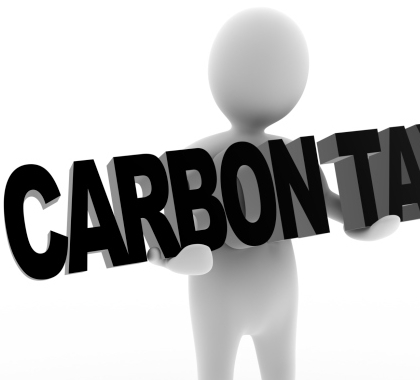Several state legislatures, including those of Connecticut, Hawaii, and Utah, are considering establishing taxes on carbon dioxide emissions from fossil fuel use.
The purpose of the tax, typically referred to as a “carbon tax,” is to decrease carbon dioxide emissions in an effort to mitigate climate change.
Would Rise Every Year
Connecticut’s proposal would tax “any petroleum derivative that is commonly burned to produce heat, electricity or motion or that is commonly processed to produce synthetic gas for burning, including, but not limited to, propane, gasoline, unleaded gasoline, kerosene, heating oil, diesel fuel, kerosene-based jet fuel and number 4 oil, number 5 oil and residual oil for utility and nonutility uses,” based on the amount of carbon dioxide emissions their use produces.
The tax would begin at $15 per ton in 2020 and increase by $5 per ton each subsequent year, indefinitely. Connecticut’s tax would take effect only if Massachusetts and Rhode Island also pass carbon taxes of their own of at least $10 per ton.
Hawaii’s carbon tax would start at $10 per ton in 2019 and increase by $5 per ton every year until reaching $40 per ton in 2025.
Going for the Gold
Utah’s proposed carbon tax would ultimately be even more costly to consumers. Beginning at $10 per ton in 2020, it would increase by 3.5 percent each year until it reached $100 per ton.
Utah’s proposal would also impose an 8.89 cents per gallon gasoline tax increase in 2020, increasing by 3.5 percent each year until the tax reaches 88.9 cents per gallon. Diesel fuel would be taxed at 10.6 cents per gallon in 2020, increasing by 3.5 percent each year until the tax reaches $1.02 per gallon.
Also under Utah’s plan, jet fuel would be taxed at 9.57 cents per gallon in 2020, increasing by 3.5 percent each year until the tax reaches 95.7 cents per gallon. Natural gas would be taxed at 53.12 cents per 1,000 cubic feet in 2020, increasing by 3.5 percent each year until reaching $5.31 per 1,000 cubic feet.
Lower Income, Heavier Burden
There are at least two problems inherent to carbon taxes: they hurt the poor and do nothing to prevent future warming, says Tim Benson, a policy analyst at The Heartland Institute, which publishes Environment & Climate News.
“Carbon taxes are extremely regressive because low-income families spend proportionally more on energy than higher-income families,” Benson said. “Carbon taxes, like every energy tax, hit poorer families especially hard, which is why nearly every carbon tax bill introduced contains some form of rebate or tax credit for residents in general or low-income households in particular.
“Though not specifically targeting the poor for relief, Connecticut’s plan would return 45 percent of raised revenue back to businesses and 50 percent of the revenue would be returned to Connecticut residents through direct dividend payments,” said Benson. “By contrast, and unusual compared to the vast majority of carbon tax proposals, Hawaii’s carbon tax bill would not return any money to businesses or the poor to counteract the higher costs the tax would impose upon them.”
Biased Against Farms, Industry
Oren Cass, a senior fellow at The Manhattan Institute, says the carbon tax pits low-income households and people living in rural areas and working at factories against wealthier urban residents and workers.
“There is a near-unanimous recognition among economists a carbon tax is incredibly regressive because lower income households pay a much larger share of their income on energy consumption than higher income households,” Cass said. “A carbon tax is regressive in other ways as well because you’re hitting people living in rural areas a lot harder because they typically use more energy.
“You’re also hitting people working heavy industry especially hard, because manufacturing in energy-intensive,” said Cass. “As a result, a carbon tax is a perfect tax for the urban knowledge worker at the expense of rural people and factory workers.”
‘Pointless and Futile’
Benson says carbon taxes do nothing to prevent climate change.
“Carbon taxes are ineffective at preventing global warming,” said Benson. “Even if the entire United States adopted a carbon tax, without rest of the world also adopting one, it would reduce global temperatures by so little you couldn’t even accurately measure it.
“Imagine how pointless and futile a gesture a carbon tax would be in, say, Vermont, which is home to only something like 0.00009 percent of the Earth’s population,” Benson said.
Easier Than Real Work
Cass says carbon tax proposals are a simple though harmful way for legislators to appear to be doing something to combat climate change.
“For state legislators who want to prove they are doing something about climate change, supporting a carbon tax is one of the easiest ways to do so,” said Cass. “By comparison, setting up a state cap-and-trade system is complex and subsidizing research and development is expensive.
“States could raise renewable portfolio standards (RPS), but if a state wants to achieve significant emission reductions, allowing legislators to beat their chests and proclaim they’re making real progress in reducing greenhouse gases, then they have to raise standards significantly, to 50 percent, 75 percent, or even 100 percent, which is completely implausible,” Cass said.
Kenneth Artz ([email protected]) writes from Dallas, Texas.
INTERNET INFO
Tim Benson, “Research & Commentary: Carbon Tax Proposal Still a Bad Deal for Connecticut Residents,” The Heartland Institute, March 12, 2018:
Tim Benson, “Research & Commentary: Carbon Tax Proposal is a Bad Idea for Utah,” The Heartland Institute, March 12, 2018:
Tim Benson, “Research & Commentary: Carbon Tax Proposal Would be Harmful to Hawaii Residents, Businesses,” The Heartland Institute, March 8, 2018:





